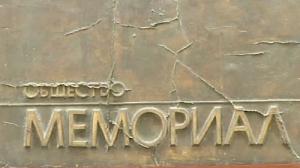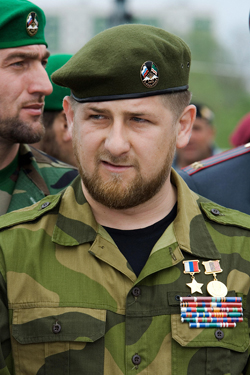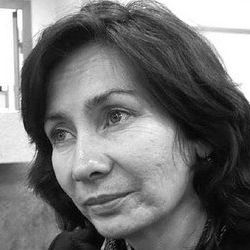 “I welcome the ruling in our colleague Oleg Petrovich’s case as a step in the right direction for a judicial system that historically has lacked willingness to support and protect human rights defenders,” says Norwegian Helsinki Committee’s (NHC) Secretary General Bjørn Engesland.
“I welcome the ruling in our colleague Oleg Petrovich’s case as a step in the right direction for a judicial system that historically has lacked willingness to support and protect human rights defenders,” says Norwegian Helsinki Committee’s (NHC) Secretary General Bjørn Engesland.
“This is also Russia’s obligation, according to the UN Declaration on human rights defenders. The ruling sends a signal to the Chechen leader Ramzan Kadyrov that the law cannot be twisted to serve the purposes of those who undermine it,” says Engesland.
Orlov accused Kadyrov for murder of Estemirova
Mr. Orlov accused President Kadyrov of being politically responsible for the murder of Estemirova. Estemirova was a frequent critic of the Chechen leadership and President Kadyrov.
In July 2009, she was abducted from her home as she was preparing an extensive report on human rights abuses in Chechnya. Soon after, authorities found her body, with bullet wounds to the head and chest. No one has yet been brought to justice for her murder.
authorities found her body, with bullet wounds to the head and chest. No one has yet been brought to justice for her murder.
Immediately following the death of Estemirova, Orlov held a press conference in which he told reporters he was certain that President Kadyrov carried at least some responsibility for her murder.
After successfully winning a civil suit for defamation against Orlov in 2009, Kadyrov lodged a criminal complaint and his lawyer was seeking to impose a 3-year prison sentence on the human rights defender. Defamation suits appear to be a way of pressuring critics to stay silent regarding perceived human rights abuses.
Trial lasted nine months
Moscow’s Khamonivski District Court handed down the ruling after a trial that lasted nine months.
On 3 March Oleg Orlov explained in a court how he considers Ramzan Kadyrov to be responsible for the murder of Natalia Estemirova. He quoted from dozens of statements made by the head of Chechnya himself or his close allies, claiming to have full control over events in Chechnya, justifying unlawful actions against alleged enemies of the state or enemies of the Chechen people and calling human rights defenders, including staff from Memorial, “enemies of the people”.
According to Friederike Behr, Russia researcher for Amnesty International, who attended hearings, Oleg Orlov also reminded the judge that in his statement, made on 16 July 2009, he said that he did not know if Ramzan Kadyrov had ordered the killing. Rather he took into consideration the strict control Ramzan Kadyrov has over the Chechen Rep ublic as well as the negative attitude Ramzan Kadyrov expressed towards human rights defenders.
ublic as well as the negative attitude Ramzan Kadyrov expressed towards human rights defenders.
Several witnesses were asked if Natalia Estemirova was afraid of Ramzan Kadyrov. Natalia was not the kind of person who would talk much about her fears. She told her closest friends and colleagues about serious threats against her but she did not share her concerns for her own safety widely or ever turned to the authorities asking for protection. She considered threats against others to be more serious than her own situation.
Acquittal
“It’s a joyous and surprising occasion, said Orlov following the decision. Although I knew the law was on our side, I thought from the start that the process was politicized and that the odds were against my acquittal. Judge Karina Morozova, however, held that under Russian law, an individual cannot be criminally responsible for statements made that they believed to be true, and that no evidence of a criminal intent on behalf of the defendant had been disclosed in court,” Orlov continued. “I’m glad not just because I’ve been vindicated, but because justice has been done. It’s a very rare thing.”
“This gives some hope for justice in Russia,” said Tanya Lokshina, Russia researcher at Human Rights Watch.
Under Russia’s criminal libel statutes, Orlov faced a potential sentence of up to three years in prison. On June 7, President Dmitri Medvedev introduced amendments to Russia’s criminal code that would decriminalize libel, making it instead an administrative offense. The amendments are pending in the Duma.
“Libel should never be a criminal offense,” Lokshina said. “Decriminalizing libel would be a meaningful advance for protecting free speech. Maybe soon no other Russian human rights defender or journalist will have to fight the tough legal battle that Orlov just won just to express their opinions.”
Background
Oleg Orlov, Russian human rights defender, had received in Decembe r 2009 the European Parliament’s Sakharov Prize for Freedom of Thought.
r 2009 the European Parliament’s Sakharov Prize for Freedom of Thought.
After the publication of a statement on July 15, 2009 in which Oleg Orlov indicated he believed the Chechen President was responsible for themurder of Ms. Natalia Estemirova, Ramzan Kadyrov had initiated the lawsuit against Orlov.
On 9 February 2010 Ramzan Kadyrov publically announced that he would drop the criminal proceedings he initiated against Mr. Oleg Orlov.
On 21 January 2010 Oleg Orlov was condemned by the Moscow City Civil Court to pay 20,000 rubles (approximately 460 Euros) in damages to Kadyrov.
Related articles:
Human rights activist from Memorial beaten in Moscow
Russia: trial of Oleg Orlov, head of Memorial, continues
Kadyrov drops charges against two human rights defenders but pressure continues


